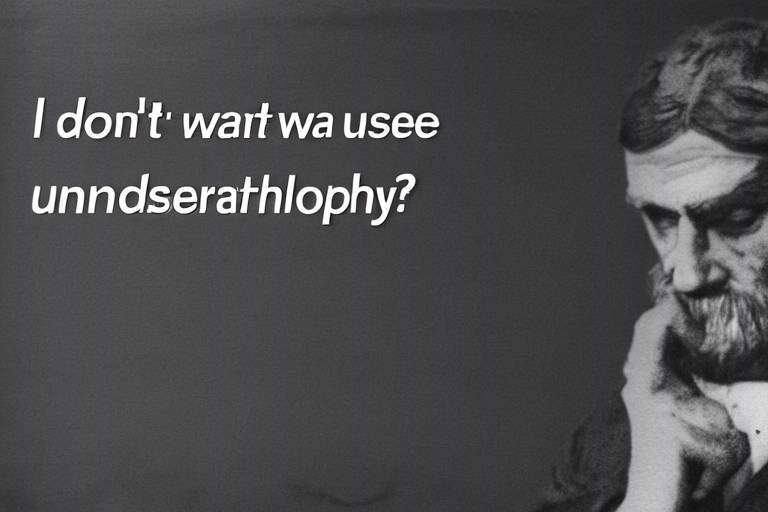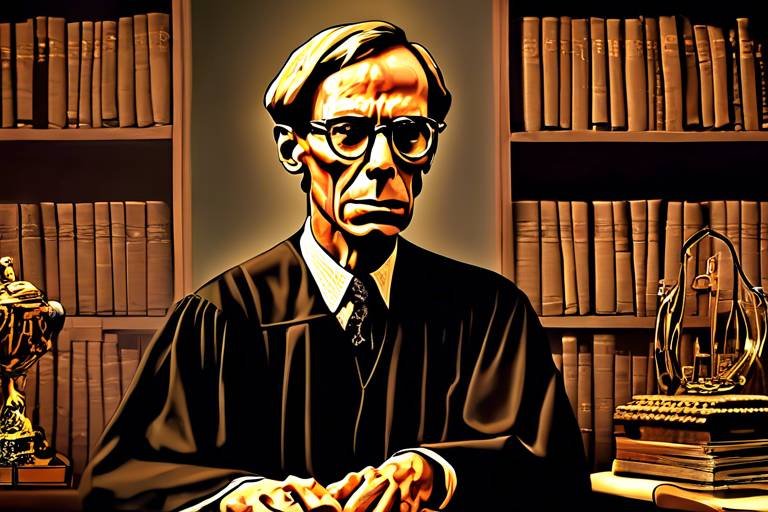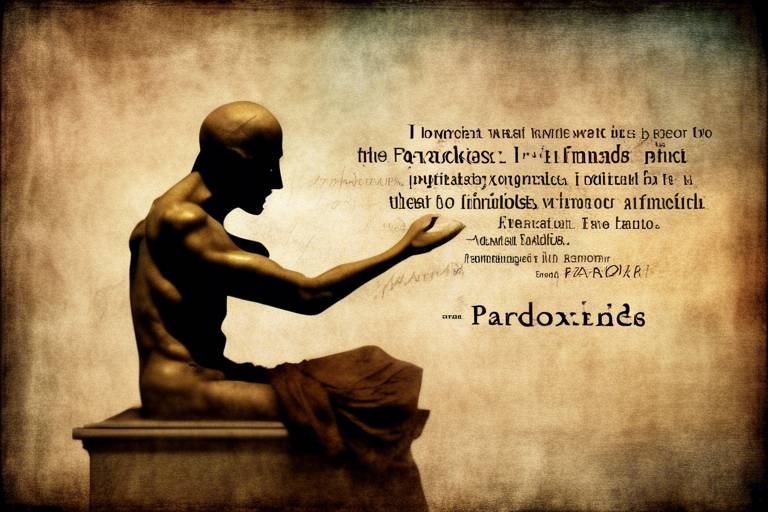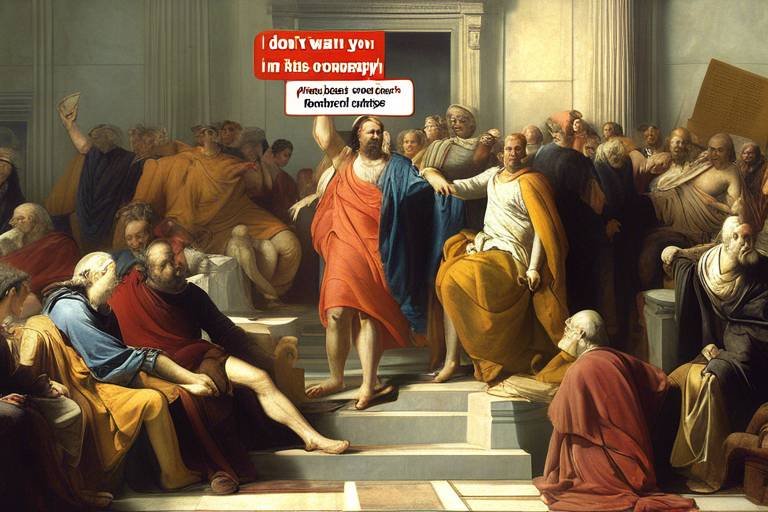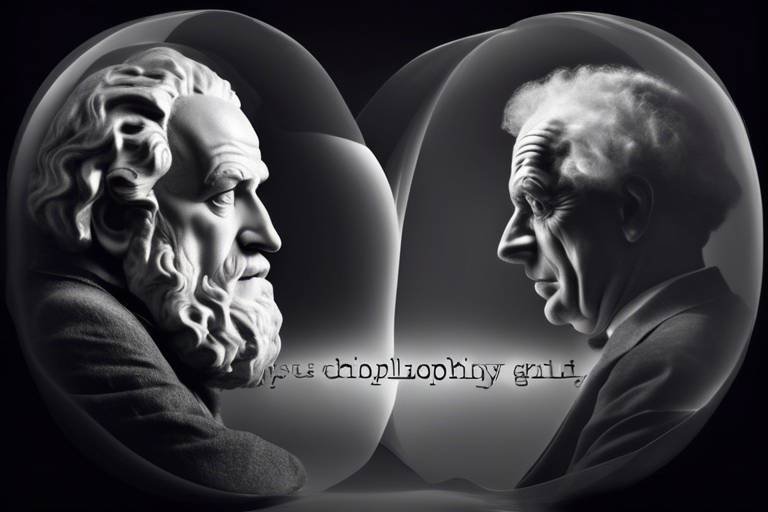Unveiling the Philosophical Aspects of Dreams
Dreams have fascinated humanity for centuries, serving as a mysterious bridge between our waking lives and the depths of our subconscious. They are often seen as mere figments of our imagination, yet their implications stretch far beyond simple storytelling. In the realm of philosophy, dreams challenge our understanding of reality, consciousness, and even our very existence. Have you ever woken up from a dream so vivid that you questioned what was real? This article dives deep into the intricate relationship between dreams and philosophical thought, exploring how various theories and interpretations have shaped our understanding of these nightly adventures.
At the core of our exploration lies the question: what are dreams, really? Are they mere reflections of our thoughts and experiences, or do they hold deeper meanings and insights about our lives? Throughout history, dreams have been viewed through various lenses, from ancient civilizations interpreting them as divine messages to modern philosophers examining their psychological implications. As we unravel the philosophical aspects of dreams, we will discover how they challenge our perceptions of reality and push the boundaries of human consciousness.
As we embark on this journey, we will explore the nature of dreams, their historical perspectives, and how they intertwine with our understanding of consciousness. We will delve into the contributions of influential thinkers like Sigmund Freud and Carl Jung, who have provided profound insights into the significance of dreams in understanding the human psyche. Additionally, we will reflect on the philosophical implications of dreams, questioning the very fabric of reality and existence itself. So, buckle up, as we unveil the philosophical aspects of dreams and their lasting impact on our understanding of who we are.
Dreams are often elusive, slipping through our fingers like sand. They can transport us to fantastical worlds or confront us with our deepest fears. But what makes dreams so compelling? At their core, dreams are subjective experiences that challenge our understanding of reality. They blur the lines between what is real and what is imagined, inviting us to reconsider how we perceive the world around us. Imagine waking up from a dream where you were flying, only to realize that the sensation of freedom felt more real than your morning coffee. This paradoxical nature of dreams invites us to question the very essence of our experiences.
Moreover, dreams often reflect our innermost thoughts and desires, serving as a canvas for our subconscious mind. They can reveal hidden truths about our lives, relationships, and fears, acting as a mirror that reflects our emotional landscape. In this way, dreams become not just a product of our imagination, but a vital component of our self-discovery. Have you ever had a dream that left you pondering its meaning long after you woke up? This is the power of dreams—they can resonate with us on a profound level, prompting us to explore our thoughts and feelings in ways we may not have considered before.
Throughout history, dreams have been interpreted in myriad ways, shaped by cultural beliefs and philosophical thought. Ancient civilizations often regarded dreams as messages from the divine, offering insights into the future or guidance in decision-making. For instance, the Egyptians believed that dreams were a means of communication with the gods, while the Greeks viewed them as omens or prophecies. These interpretations highlight the significance of dreams in understanding the human experience, as they were seen as a connection to something greater than ourselves.
In ancient Egypt, dreams held a sacred status, often associated with the afterlife and prophecy. Egyptians believed that the soul could leave the body during sleep, allowing it to journey into the realm of the gods. Dreams were meticulously recorded and interpreted by priests, who would provide guidance based on their content. This reverence for dreams illustrates how integral they were to the spiritual and cultural fabric of society.
In Ancient Egyptian society, dreams were seen as crucial for understanding one's fate and destiny. They believed that the gods communicated through dreams, offering wisdom and foresight. People would seek the counsel of dream interpreters to decipher the messages hidden within their dreams, which could influence important life decisions, such as marriage or career choices. The significance of dreams in this context underscores their role as a bridge between the earthly and the divine.
Greek philosophers, such as Aristotle and Plato, also engaged with the concept of dreams, albeit from a more analytical perspective. Plato viewed dreams as reflections of our waking thoughts, while Aristotle considered them as a means of processing experiences and emotions. Their discussions laid the groundwork for future explorations into the psychological and metaphysical implications of dreaming, inviting us to ponder the deeper meanings behind our nightly escapades.
As we conclude our exploration of the philosophical aspects of dreams, it's clear that they hold a significant place in our understanding of consciousness and reality. Dreams challenge our perceptions, prompting us to question what is real and what is imagined. They serve as a window into our subconscious, offering insights into our desires, fears, and innermost thoughts. The philosophical reflections on dreams not only enrich our understanding of human existence but also invite us to embrace the mystery and wonder that dreams bring to our lives.
- What are dreams? Dreams are subjective experiences that occur during sleep, often reflecting our thoughts, emotions, and subconscious mind.
- Why are dreams important? Dreams can provide insights into our psyche, helping us understand our desires, fears, and emotional states.
- How have different cultures interpreted dreams? Throughout history, various cultures have viewed dreams as messages from the divine, omens, or reflections of our waking thoughts.
- What is the significance of dreams in philosophy? Philosophical discussions on dreams challenge our understanding of reality, consciousness, and existence, prompting us to question what it means to be human.

The Nature of Dreams
Dreams are one of the most intriguing phenomena of human consciousness, often leaving us in a state of wonder and curiosity. They can transport us to fantastical realms, evoke intense emotions, and sometimes even provide insights into our waking lives. But what exactly are dreams? At their core, dreams are subjective experiences that occur during sleep, primarily during the REM (Rapid Eye Movement) phase. This stage of sleep is characterized by heightened brain activity, which mirrors that of being awake, leading to vivid and often surreal dream experiences.
The elusive nature of dreams challenges our understanding of reality and perception. Unlike the tangible world we navigate during our waking hours, dreams can defy the laws of physics and logic, allowing us to experience the impossible. For instance, have you ever flown in a dream, soared over landscapes with a sense of freedom that feels utterly real? This ability to transcend the limitations of our physical existence is one of the most fascinating aspects of dreaming.
Moreover, dreams often reflect our innermost thoughts, fears, and desires. They serve as a window into our subconscious mind, revealing aspects of ourselves that we may not be fully aware of during our waking life. For example, a dream about falling might indicate feelings of insecurity or loss of control, while dreams of being chased could symbolize avoidance of a particular issue. The interpretation of these dreams can vary widely, influenced by personal experiences and cultural backgrounds.
To better understand the nature of dreams, consider the following characteristics:
- Subjectivity: Each person's dream experience is unique and shaped by their individual thoughts and emotions.
- Elusiveness: Dreams often fade from memory upon waking, making them difficult to recall and analyze.
- Symbolism: Many dreams contain symbols that can be interpreted to reveal deeper meanings about our lives.
- Emotional Impact: Dreams can evoke strong feelings, ranging from joy to fear, which can linger even after waking.
The interplay between dreams and our waking reality raises profound questions about consciousness and existence. Are dreams merely random firings of neurons, or do they hold deeper significance? Philosophers and psychologists have long debated the implications of dreaming, arguing that they can offer insights into our psyche and the nature of reality itself. As we delve deeper into the philosophical aspects of dreams, we begin to uncover their potential to inform our understanding of who we are and how we perceive the world around us.

Historical Perspectives on Dreams
Throughout history, dreams have been a source of fascination, mystery, and profound inquiry. Different cultures and philosophers have approached dreams with varying interpretations, often reflecting their societal values, beliefs, and understanding of the human psyche. From ancient civilizations that viewed dreams as divine messages to modern thinkers who explore their psychological implications, the historical perspectives on dreams reveal a rich tapestry of thought and inquiry.
In ancient times, dreams were often seen as a bridge between the earthly and the divine. They were thought to carry important messages from the gods or the deceased. For instance, in Ancient Egypt, dreams were considered a vital part of life, influencing decisions and guiding individuals in their everyday actions. The Egyptian Book of Dreams, a collection of dream interpretations, served as a guide for understanding the significance of dreams, often linking them to prophetic insights and the afterlife.
Similarly, the Greek philosophers made significant contributions to the understanding of dreams. Plato, in his dialogues, suggested that dreams could reveal truths about the soul and its desires, while Aristotle viewed dreams more empirically, proposing that they were reflections of our waking experiences. This philosophical inquiry into dreams laid the groundwork for future explorations into the nature of consciousness and reality.
As we delve deeper into the historical perspectives on dreams, we find that various ancient civilizations held unique beliefs about their significance. For example:
- Egyptians: Dreams were seen as messages from the gods, often interpreted by priests who served as dream interpreters.
- Greeks: Dreams were viewed as a means of understanding the self and the universe, with philosophers like Aristotle providing frameworks for their analysis.
- Indigenous Traditions: Many Indigenous cultures regarded dreams as sacred, viewing them as a way to connect with ancestors and the spiritual realm.
The significance of dreams in these cultures underscores their role as a vital aspect of human experience, shaping not only individual lives but also communal beliefs and practices. The interpretations varied widely, but a common thread was the understanding that dreams held a deeper meaning, often extending beyond mere subconscious reflections.
In Ancient Egypt, dreams were intricately woven into the fabric of society. They were not just personal experiences but were believed to have societal implications. The Egyptians developed a sophisticated system of dream interpretation, which was documented in texts such as the Dream Book of the Ancient Egyptians. This book categorized dreams and provided insights into their meanings, emphasizing their importance in decision-making, both personally and politically. Dreams were seen as prophetic, and many leaders sought guidance through their dreams, believing that they could predict the future or provide warnings about impending dangers.
Greek philosophers approached dreams with a blend of skepticism and curiosity. Plato, for instance, considered dreams as reflections of the soul's desires and its quest for truth. In contrast, Aristotle's view was more grounded in observation; he believed that dreams were the brain's way of processing experiences and emotions from waking life. This divergence in thought laid the groundwork for future philosophical discussions on the nature of reality and consciousness. The Greeks' exploration of dreams not only influenced their own culture but also left a lasting impact on Western philosophy as a whole.
As we transition into modern philosophical theories, the legacy of these ancient perspectives continues to resonate. The way dreams were understood in the past has paved the way for contemporary discussions about the nature of consciousness, reality, and human existence, showing that dreams are not merely fleeting images but profound experiences that invite us to explore the depths of our psyche.
What is the significance of dreams in ancient cultures?
Dreams were often seen as messages from the divine, guiding individuals in their decisions and beliefs. They played a crucial role in understanding life, death, and the universe.
How did Greek philosophers interpret dreams?
Greek philosophers had varied interpretations of dreams. Plato viewed them as reflections of the soul's desires, while Aristotle considered them as a means of processing waking experiences.
Are dreams important in modern philosophy?
Yes, modern philosophy continues to explore the nature of dreams, particularly their implications for consciousness, reality, and human existence, building on the foundations laid by ancient thinkers.

Ancient Civilizations and Dreams
Throughout history, dreams have been viewed with a sense of awe and reverence, particularly by ancient civilizations. These cultures often regarded dreams as profound messages from the divine, a bridge between the earthly realm and the spiritual world. In many ways, dreams served as a canvas where the subconscious painted its mysteries, revealing insights that were often deemed too significant to ignore. For instance, the Egyptians believed that dreams were a means of communication with the gods, while the Greeks pondered their philosophical implications. This interplay between the mystical and the rational has shaped how we understand dreams even today.
In Ancient Egypt, dreams held a particularly esteemed position. They were not merely seen as random nocturnal occurrences but were often interpreted as prophetic visions. The Egyptians had a plethora of dream interpreters who specialized in deciphering these nighttime narratives. They believed that dreams could provide guidance, foretell the future, and even offer insights into the afterlife. For example, the famed "Dream Book of the Ancient Egyptians" listed various dreams and their interpretations, showcasing how seriously these visions were taken in society.
Similarly, the Greeks had their own interpretations of dreams, which were deeply intertwined with their philosophical inquiries. Philosophers such as Aristotle and Plato contemplated the nature of dreams, questioning their reality and significance. Aristotle, for instance, viewed dreams as reflections of our waking experiences, suggesting that they were not merely fantastical but were rooted in reality. In contrast, Plato saw dreams as a form of divination, a way to tap into the eternal truths that lay beyond our immediate perception. This philosophical dichotomy illustrates the rich tapestry of thought surrounding dreams in ancient Greece.
| Ancient Civilization | View on Dreams | Notable Practices |
|---|---|---|
| Egyptians | Divine messages and prophecies | Dream interpretation by priests |
| Greeks | Philosophical reflections and divination | Dream analysis by philosophers |
| Indigenous Cultures | Spiritual journeys and guidance | Rituals and vision quests |
Indigenous cultures around the world also held dreams in high regard, often viewing them as spiritual journeys. For these societies, dreams were not just personal experiences but communal narratives that could guide entire tribes. Many Indigenous peoples engaged in vision quests, where individuals would seek dreams to gain insight into their purpose and place within the community. This practice underscores the universal significance of dreams across cultures, highlighting their role in shaping identity and community values.
In summary, ancient civilizations perceived dreams as powerful phenomena that transcended mere sleep. They were considered gateways to divine wisdom, philosophical insights, and communal identity. As we delve deeper into the philosophical aspects of dreams, it becomes clear that these nocturnal experiences have shaped human thought and existence in profound ways. The exploration of dreams in ancient cultures not only enriches our understanding of history but also invites us to reflect on our own dream experiences and their meanings in our lives today.
- What role did dreams play in ancient Egyptian society?
Dreams were seen as prophetic messages from the gods, and they were interpreted by priests to provide guidance and insight into the future.
- How did Greek philosophers interpret dreams?
Greek philosophers like Aristotle and Plato viewed dreams as reflections of reality and as a means of accessing deeper truths about existence.
- What significance do dreams hold in Indigenous cultures?
In many Indigenous cultures, dreams are considered spiritual journeys that provide guidance and insight into personal and communal identity.

Dreams in Ancient Egypt
In Ancient Egypt, dreams were not merely fleeting images that faded with the dawn; they were considered profound messages from the divine, holding significant meanings and prophecies. The Egyptians believed that dreams served as a bridge between the mortal world and the realm of the gods, allowing individuals to receive guidance, warnings, and insights about their lives. This belief was so deeply ingrained in their culture that it permeated various aspects of their daily existence, from governance to personal decision-making.
The Egyptians developed a rich tapestry of dream interpretation, often documented in texts such as the "Dream Book," which categorized dreams based on their content and offered explanations and predictions. For instance, dreams involving animals were interpreted as omens related to health or fortune, while those featuring deceased relatives were viewed as communications from the afterlife. This intricate system of interpretation reflected their understanding of the cosmos, where every element was interconnected.
Moreover, the role of dreams in Ancient Egyptian society extended beyond individual interpretation. Dreams were also seen as tools for the Pharaohs, who relied on them to make critical decisions regarding warfare, agriculture, and diplomacy. The belief that a Pharaoh could receive divine instruction through dreams reinforced their authority and connection to the gods. It was not uncommon for priests and priestesses to be called upon to interpret the dreams of these rulers, ensuring that their actions aligned with divine will.
Interestingly, the Egyptians also recognized the potential for dreams to reveal hidden truths about oneself. They believed that dreams could unveil repressed emotions, desires, and fears, providing a pathway to self-discovery. This perspective resonates with modern psychological interpretations of dreams, highlighting the timeless nature of our quest to understand the self.
In summary, dreams in Ancient Egypt were far more than mere nocturnal musings; they were vital elements of a complex spiritual and philosophical framework. By viewing dreams as divine messages, the Egyptians not only enriched their understanding of existence but also laid the groundwork for future explorations of the dream realm in various cultures and philosophies. Their legacy continues to resonate, inviting us to ponder the significance of our own dreams and the messages they may hold.
- What role did dreams play in Ancient Egyptian culture? Dreams were viewed as messages from the divine, offering guidance and insights for both individuals and rulers.
- How were dreams interpreted in Ancient Egypt? Egyptians utilized texts like the "Dream Book" to categorize and interpret dreams based on their content and symbolism.
- Did Pharaohs rely on dreams for decision-making? Yes, Pharaohs often consulted priests to interpret their dreams, believing these dreams contained divine instructions for governance and warfare.
- Can dreams reveal personal truths? Ancient Egyptians believed that dreams could unveil hidden emotions and desires, a concept that aligns with modern psychological interpretations.

Greek Philosophical Interpretations
The ancient Greeks held a profound fascination with dreams, viewing them not merely as random nocturnal musings but as significant phenomena that could offer insights into reality and the human condition. Two of the most influential philosophers of this era, Plato and Aristotle, approached the subject of dreams with distinct perspectives that continue to resonate in modern philosophical discussions. For Plato, dreams were a reflection of the soul's journey and its quest for truth, while Aristotle took a more empirical stance, analyzing dreams through the lens of natural phenomena and psychological processes.
Plato, in his dialogues, suggested that dreams could serve as a medium for divine communication. He believed that dreams might reveal truths that are obscured during waking life, acting as a bridge between the physical world and the realm of ideas. In his work, the Republic, he posits that dreams can reflect our desires and fears, allowing us to confront aspects of our psyche that we might otherwise ignore. This notion aligns with the idea that dreams possess a certain metaphysical significance, offering glimpses into the higher realities beyond our immediate perceptions.
On the other hand, Aristotle took a more pragmatic approach. In his treatise, On Dreams, he argued that dreams are the result of sensory experiences and physiological processes that occur during sleep. He posited that dreams are influenced by our waking experiences and emotions, suggesting that they serve a purpose in processing our daily lives. Aristotle's analysis laid the groundwork for future explorations into the psychological aspects of dreams, emphasizing that while dreams may hold meaning, they are fundamentally tied to our conscious experiences.
The contrasting views of Plato and Aristotle highlight a broader philosophical discourse regarding the nature of dreams. While Plato's idealism suggests that dreams can guide us toward higher truths, Aristotle's realism grounds dreams in the tangible realities of human experience. This dichotomy raises intriguing questions: Are dreams merely reflections of our subconscious, or do they possess an intrinsic value that transcends our waking lives? The dialogue between these two perspectives continues to inform contemporary debates about the significance of dreams in understanding human consciousness.
In addition to these foundational philosophies, the Greeks also engaged with the idea of prophetic dreams. Many believed that dreams could serve as omens or messages from the gods, influencing decisions and actions in the waking world. This belief system intertwined with their understanding of fate and destiny, as individuals sought to interpret their dreams in the context of their lives. The interplay between dreams and divine influence underscored the Greeks' deep-seated belief in a cosmos imbued with meaning, where every experience, including dreams, could be a reflection of a greater order.
To summarize, Greek philosophical interpretations of dreams reveal a rich tapestry of thought that grapples with the complexities of human existence. From Plato's idealistic visions to Aristotle's empirical analyses, the exploration of dreams in ancient Greece invites us to consider the profound implications of our nocturnal experiences. As we continue to ponder the significance of dreams, we find ourselves navigating a landscape where philosophy, psychology, and spirituality converge, challenging our understanding of reality and consciousness.
- What did Plato believe about dreams?
Plato viewed dreams as reflections of the soul's journey and potential revelations of higher truths.
- How did Aristotle interpret dreams?
Aristotle believed dreams were influenced by sensory experiences and served a purpose in processing our daily lives.
- Did the Greeks believe dreams had prophetic significance?
Yes, many ancient Greeks believed that dreams could be omens or messages from the gods, impacting their decisions.

Modern Philosophical Theories
In the realm of modern philosophy, dreams have sparked fascinating discussions and debates that continue to intrigue scholars and thinkers alike. The way we interpret dreams has evolved, reflecting shifts in our understanding of consciousness and reality. Notably, several influential philosophers have contributed to this discourse, each offering unique perspectives that challenge our preconceived notions about the nature of dreams and their significance.
One of the most compelling modern theories comes from the works of Edmund Husserl, who introduced the concept of phenomenology. He emphasized the importance of subjective experience, suggesting that dreams should be viewed as genuine phenomena that reveal the inner workings of the mind. According to Husserl, dreams are not mere illusions; instead, they provide valuable insights into our conscious and subconscious states. This perspective encourages us to delve deeper into our dream experiences, questioning what they might reveal about our desires, fears, and the very essence of our being.
Another significant contribution comes from the realm of existential philosophy, particularly through the lens of thinkers like Jean-Paul Sartre. Sartre argued that dreams, much like our waking experiences, are a part of our existence and can serve as a reflection of our search for meaning in an often chaotic and absurd world. He posited that dreams can illuminate our struggles with authenticity, as they often reveal our innermost thoughts and feelings that we may not confront in our daily lives. This brings forth an intriguing question: do our dreams serve as a mirror to our true selves, or are they simply a collection of fleeting images and sensations?
Moreover, the influence of Jacques Lacan, a prominent psychoanalyst, cannot be overlooked. Lacan's theories on the unconscious mind and desire have reshaped the way we view dreams. He proposed that dreams are a form of language, a way in which the unconscious communicates with the conscious mind. This idea aligns with Freudian principles but adds a layer of complexity by suggesting that the meaning of dreams is not always straightforward. Instead, dreams can be seen as a tapestry of symbols and narratives that require careful analysis to uncover their deeper meanings.
To further understand the modern philosophical theories surrounding dreams, we can summarize the key perspectives in the following table:
| Philosopher | Theory | Key Insight |
|---|---|---|
| Edmund Husserl | Phenomenology | Dreams reveal our inner consciousness and subjective experiences. |
| Jean-Paul Sartre | Existentialism | Dreams reflect our quest for meaning and authenticity. |
| Jacques Lacan | Psychoanalysis | Dreams are a language of the unconscious, rich with symbolism. |
In addition to these philosophical frameworks, contemporary discussions around dreams have also been influenced by advancements in neuroscience. Researchers are increasingly exploring the brain's activity during dreaming, leading to intriguing questions about the relationship between physical brain states and subjective dream experiences. This intersection of philosophy and science opens up a new avenue for understanding dreams, suggesting that they may serve not only as reflections of our inner worlds but also as manifestations of our biological processes.
Ultimately, modern philosophical theories about dreams encourage us to embrace the complexities of our dream experiences. They challenge us to consider how dreams can shape our understanding of ourselves and our place in the world. As we continue to explore the philosophical dimensions of dreaming, we may find that these elusive nighttime narratives hold more significance than we ever imagined. They are not just fleeting moments of imagination; they are profound expressions of our consciousness, identity, and existence.
- What is the significance of dreams in modern philosophy? Dreams are viewed as reflections of our consciousness and can provide insights into our desires and existential struggles.
- How do contemporary philosophers interpret dreams? They explore dreams through various lenses, including phenomenology, existentialism, and psychoanalysis, each offering unique insights into the nature of dreaming.
- Can dreams influence our waking lives? Yes, many philosophers and psychologists argue that dreams can reveal hidden aspects of our psyche that may affect our thoughts and behaviors in waking life.

Dreams and Consciousness
When we delve into the realm of dreams, we uncover a fascinating interplay between our subconscious and conscious mind. Dreams, those mysterious narratives that unfold while we sleep, serve as a reflection of our innermost thoughts, desires, and fears. It’s almost like peering through a window into our psyche, revealing layers of our identity that we might not fully comprehend while awake. But what exactly does this mean for our understanding of consciousness?
Many philosophers and psychologists have pondered the significance of dreams in relation to consciousness. They propose that dreams are not merely random images or stories, but rather a vital component of our mental landscape. For instance, the renowned psychoanalyst Sigmund Freud suggested that dreams are a gateway to our repressed desires and unresolved conflicts. According to Freud, the content of our dreams can unveil hidden aspects of our personality and provide insight into our waking life.
On the other hand, Carl Jung, another influential figure in psychology, viewed dreams as a means of self-discovery. He believed that dreams could help us connect with the collective unconscious—a reservoir of shared human experiences and archetypes. Jung argued that by analyzing our dreams, we can uncover personal and universal truths that guide us in our journey of self-realization. This perspective invites us to consider dreams not just as fleeting experiences, but as profound messages that can shape our understanding of ourselves and our place in the world.
To illustrate the connection between dreams and consciousness, let’s explore some key theories:
| Theorist | Perspective | Key Ideas |
|---|---|---|
| Sigmund Freud | Psychoanalytic Theory | Dreams reveal repressed desires and conflicts; they serve as a form of wish fulfillment. |
| Carl Jung | Analytical Psychology | Dreams connect us to the collective unconscious and facilitate personal growth and self-discovery. |
| Francis Crick | Neuroscientific Approach | Dreams help to sort and organize memories, aiding in problem-solving and creativity. |
These theories highlight the multifaceted nature of dreams and their relation to consciousness. While Freud emphasizes the psychological aspects, Jung focuses on the symbolic meanings that can lead to personal growth. Meanwhile, modern neuroscientific perspectives, like that of Francis Crick, suggest that dreaming plays a crucial role in memory consolidation and cognitive functioning.
Moreover, dreams can also influence our waking thoughts and behaviors. Have you ever woken up from a vivid dream feeling inspired or unsettled? This phenomenon illustrates how dreams can impact our emotional and cognitive states. They can serve as a source of creativity, problem-solving, or even anxiety. For instance, a person grappling with a tough decision may find clarity in a dream that presents a solution or a new perspective.
In essence, the relationship between dreams and consciousness is like a dance—each influencing the other in a continuous cycle. Dreams provide a canvas for our subconscious to express itself, while our conscious mind interprets and reacts to these nocturnal narratives. This interplay raises intriguing questions about the nature of reality and our understanding of existence. Are we more than just our waking selves? Do our dreams hold a deeper significance that transcends the boundaries of sleep?
As we continue to explore the philosophical implications of dreams, it becomes increasingly clear that they are not merely a byproduct of sleep, but a vital aspect of our human experience. They challenge our perceptions, enrich our understanding of consciousness, and invite us to engage in a deeper dialogue with ourselves. So, the next time you drift off to sleep, consider what your dreams might reveal about your inner world and the profound mysteries of consciousness.
- What are dreams? Dreams are sequences of images, thoughts, and emotions that occur during sleep, often reflecting our subconscious mind.
- Why do we dream? Theories suggest dreams serve various purposes, including processing emotions, consolidating memories, and providing creative insights.
- Can dreams influence our waking life? Yes, dreams can impact our emotions, decisions, and creativity, often leading to new perspectives on our waking challenges.
- How can I remember my dreams better? Keeping a dream journal and practicing mindfulness before sleep can enhance dream recall and understanding.

Freudian Perspectives
When we dive into the world of dreams, one name often comes to mind: Sigmund Freud. This pioneering psychologist didn't just scratch the surface; he plunged into the depths of the human psyche, unveiling layers that many were too afraid to explore. Freud proposed that dreams are not merely random images or fleeting thoughts, but rather a window into our subconscious mind. He famously stated, "Dreams are the royal road to the unconscious," suggesting that they reveal our hidden desires, fears, and conflicts.
According to Freud, dreams serve as a form of psychological release. They transform our repressed wishes and unresolved issues into a narrative that can be processed during sleep. This transformation occurs through a process he termed dream work, where the latent content (the hidden meaning) of the dream is masked by the manifest content (the actual storyline of the dream). For instance, if someone dreams about losing their teeth, Freud might interpret this as a symbol of anxiety about aging or a fear of losing control in some aspect of their life.
Freud categorized dreams into various types, including:
- Wish-fulfillment dreams: These dreams reflect our deepest desires and aspirations.
- Nightmares: Often stemming from anxiety or trauma, these dreams reveal our fears.
- Recurring dreams: These suggest unresolved conflicts that demand attention.
Freud's emphasis on sexuality also plays a significant role in his dream analysis. He believed that many dreams revolve around sexual themes, often masked by symbolism. For example, a dream about climbing a mountain might represent a quest for sexual conquest or desire. This perspective, while controversial, opened the door to the idea that dreams could be analyzed for deeper psychological meanings.
However, Freud's theories are not without criticism. Many modern psychologists argue that his interpretations are overly focused on sexuality and may not account for the complexities of the human experience. Despite this, his work laid the groundwork for future explorations into the nature of dreams and their significance in understanding human behavior.
In summary, Freud's perspectives on dreams invite us to consider them as more than just whimsical narratives. They challenge us to look within, to confront our deepest fears and desires, and to recognize that our dreams may hold the keys to understanding our waking lives. As we continue to explore the realm of dreams, Freud's insights remain a cornerstone of psychological thought, urging us to question not just what we dream, but why we dream.
- What is the main idea behind Freud's dream theory? Freud believed that dreams are a reflection of our subconscious, revealing hidden desires and unresolved conflicts.
- How did Freud categorize dreams? He categorized dreams into wish-fulfillment dreams, nightmares, and recurring dreams, each serving different psychological purposes.
- Are Freud's interpretations still relevant today? While some of Freud's ideas have been criticized, his work remains foundational in the study of dreams and psychology.

Jungian Analysis of Dreams
The exploration of dreams through the lens of Carl Jung's theories opens up a fascinating realm where the subconscious mind becomes a canvas of rich symbols and archetypes. Unlike his predecessor, Sigmund Freud, who primarily viewed dreams as reflections of repressed desires, Jung posited that dreams serve a much deeper purpose: they are a means of self-discovery and personal growth. Jung believed that dreams could guide individuals toward understanding their true selves, acting as a bridge between the conscious and the unconscious.
At the heart of Jungian dream analysis lies the concept of the collective unconscious. This is a shared reservoir of experiences, memories, and symbols that transcend individual consciousness. Jung argued that the images and themes appearing in our dreams are not merely personal but are also connected to universal human experiences. For instance, dreams may feature archetypes such as the Hero, the Shadow, or the Wise Old Man, which resonate across cultures and epochs. This universality suggests that our dreams are not just personal narratives but are also intertwined with the broader human experience.
To better understand how Jungian analysis interprets dreams, consider the following key elements:
- Symbols: Jung emphasized the importance of symbols in dreams. He believed that they convey messages from the unconscious, often representing aspects of the dreamer's psyche that need acknowledgment or integration.
- Archetypes: These are innate, universal symbols that shape our understanding of the world. Jung identified several archetypes that frequently appear in dreams, such as the Hero, the Mother, and the Anima/Animus.
- Individuation: Jung viewed the process of individuation—the integration of different aspects of the self—as a primary goal of personal development. Dreams play a crucial role in this process by revealing hidden parts of the self that require attention.
Jungian dream analysis is not just about interpreting dream content; it's about engaging with the dream itself. Jung encouraged individuals to explore their dreams through techniques such as active imagination, where the dreamer engages with dream figures and symbols in a conscious dialogue. This process can lead to profound insights and a deeper understanding of one's life path.
In essence, Jungian analysis of dreams offers a multifaceted approach that encourages individuals to delve into their subconscious, uncovering layers of meaning that can illuminate their waking lives. By embracing the messages within our dreams, we embark on a journey of self-discovery, leading us toward greater authenticity and wholeness.
- What is the main difference between Freudian and Jungian dream analysis? Freudian analysis focuses on repressed desires, while Jungian analysis emphasizes self-discovery and the exploration of archetypes.
- How can I apply Jungian dream analysis to my own dreams? Start by noting recurring symbols and themes in your dreams, then explore their potential meanings in relation to your personal experiences and emotions.
- Are there specific techniques for interpreting dreams in Jungian psychology? Yes, techniques such as active imagination and exploring personal associations with dream symbols can be very effective.

The Role of Dreams in Philosophy
Dreams have long served as a captivating subject within the realm of philosophy, acting as a mirror reflecting our deepest thoughts, fears, and desires. They challenge our perceptions and compel us to question the very nature of reality and existence. Philosophers have pondered the implications of dreams, considering them not merely as fleeting nighttime experiences but as significant phenomena that can shape our understanding of life itself. In this exploration, we will delve into how dreams have influenced philosophical thought and the various ways they intersect with fundamental questions about identity, reality, and the essence of being.
One of the most profound contributions to the philosophy of dreams comes from the renowned thinker René Descartes. His famous dream argument raises critical questions about the distinction between dreams and waking life. Descartes posited that if we cannot reliably differentiate between the two states, then how can we trust our perceptions of reality? This inquiry leads to a deeper epistemological discussion about what constitutes knowledge and certainty. In a world where dreams can feel as vivid and real as our waking experiences, Descartes invites us to consider the reliability of our senses and the very fabric of our existence.
Moreover, dreams have been viewed through the lens of existential philosophy, where they symbolize our quest for meaning in an often chaotic and absurd world. For existentialists, dreams can serve as a canvas for exploring our innermost struggles and aspirations. They reflect the tension between our desires for authenticity and the constraints imposed by societal norms. In this context, dreams become a space for self-exploration, allowing individuals to confront their fears and desires in a safe environment. This exploration can lead to profound insights about one’s identity and purpose in life.
In addition to Descartes, other philosophers have contributed to the discourse surrounding dreams. For instance, Immanuel Kant viewed dreams as a manifestation of our mental faculties, emphasizing their role in shaping our understanding of reality. He argued that while dreams may not provide direct insights into the physical world, they do reveal the workings of our minds and the ways we interpret our experiences. This perspective introduces a fascinating interplay between dreams and consciousness, suggesting that our dream states can illuminate aspects of our waking lives.
Furthermore, the philosophical implications of dreams extend into discussions about ontology, the study of being and existence. Questions arise regarding the ontological status of dreams: Do they hold any reality, or are they merely figments of our imagination? This inquiry leads to a broader consideration of what constitutes reality itself. Some philosophers argue that dreams, despite their ephemeral nature, possess a form of existence that is worthy of exploration. They challenge the boundaries of what we consider real and push us to expand our understanding of human experience.
In summary, the role of dreams in philosophy is multifaceted, encompassing inquiries into reality, identity, and existence. They serve as a bridge between our conscious and subconscious minds, offering valuable insights into the human experience. As we continue to explore the philosophical significance of dreams, we uncover layers of meaning that enrich our understanding of ourselves and the world around us. Dreams remind us that even in our sleep, the mind is tirelessly at work, grappling with the profound questions of life.
- What are the philosophical implications of dreams? Dreams challenge our understanding of reality and consciousness, prompting inquiries into the nature of existence and identity.
- How did René Descartes view dreams? Descartes used dreams to question the reliability of our senses and the distinction between dreams and reality.
- Can dreams reveal anything about our waking lives? Yes, many philosophers argue that dreams can provide insights into our subconscious thoughts, fears, and desires.
- What role do dreams play in existential philosophy? Dreams symbolize the search for meaning and authenticity in a chaotic world, allowing for self-exploration and confrontation of personal struggles.

Descartes and the Dream Argument
The Dream Argument proposed by René Descartes is one of the most intriguing philosophical inquiries into the nature of reality. In his quest for certainty, Descartes famously questioned the very fabric of our perceptions, suggesting that there is no definitive way to distinguish between waking life and the dream state. Imagine waking up from a vivid dream where you felt emotions so real that they lingered even after you opened your eyes. Was that experience any less valid than your daily life? This fundamental questioning leads us into a deeper exploration of consciousness and existence.
Descartes posited that our senses can deceive us. He illustrated this point with the example of dreaming, arguing that while we dream, we often perceive things that do not exist in reality. For instance, consider a dream where you are flying through the sky; while it feels real in the moment, it is merely a fabrication of your mind. Thus, how can we trust our senses when they can produce such convincing illusions? This line of reasoning culminates in what has become a central tenet of epistemology: the distinction between reality and illusion is often blurred.
To elaborate on Descartes' perspective, we can summarize his key points regarding the Dream Argument:
- Deceptive Senses: Our senses can mislead us, as demonstrated by dreams.
- Indistinguishable Experiences: There is no clear way to differentiate between a dream and waking life.
- Foundation of Knowledge: If we cannot trust our senses, what can we know for certain?
In his work, "Meditations on First Philosophy," Descartes famously declared, "I think, therefore I am." This statement underscores his belief in the certainty of one's own existence as a thinking being, even amidst the uncertainties of dreams. He argued that while we may be deceived by our senses, the very act of doubting or thinking confirms our existence. It's a fascinating paradox: the dream state may challenge our perceptions, yet it simultaneously affirms our consciousness. The implications of this argument extend far beyond mere philosophical musings; they invite us to question the nature of our reality and the very essence of what it means to exist.
Moreover, Descartes' Dream Argument has sparked countless discussions and further inquiries into the nature of consciousness and reality. For instance, modern philosophers and scientists continue to explore the neurological underpinnings of dreams, investigating how they relate to our waking thoughts and emotions. This ongoing dialogue illustrates the enduring relevance of Descartes' ideas, as they resonate with contemporary explorations of the mind. In a world where virtual realities and advanced technologies blur the lines between the real and the imagined, Descartes’ insights remain remarkably prescient.
In conclusion, Descartes' Dream Argument serves as a powerful reminder of the complexities inherent in our understanding of reality. By challenging us to scrutinize our perceptions, he invites us to embark on a journey of self-discovery and philosophical inquiry. As we navigate the realms of dreams and consciousness, we are left pondering profound questions about existence, knowledge, and the nature of reality itself.

Existential Reflections on Dreaming
Dreams, those fleeting episodes that whisk us away into realms of imagination, offer not just a canvas for our subconscious but also a profound reflection of our existential musings. When we close our eyes at night, we embark on a journey that challenges the very fabric of our reality. Have you ever woken up from a vivid dream, heart racing, only to question the line between what is real and what is imagined? This blurring of boundaries is where the existential significance of dreaming comes into play.
Existentialism, at its core, grapples with the essence of human existence, the search for meaning, and the confrontation with the absurd. In this light, dreaming becomes a mirror that reflects our innermost fears, desires, and questions about our place in the universe. Through dreams, we confront the absurdity of life, much like the characters in Albert Camus's works, who navigate a world devoid of inherent meaning. Dreams can act as a safe space where we can explore our existential dilemmas without the constraints of waking logic.
Consider the following points about the existential reflections found in dreams:
- Confrontation with the Self: Dreams often bring forth repressed emotions and thoughts that we might avoid in our waking life. They force us to confront aspects of ourselves that we may not fully understand or accept.
- Exploration of Identity: In the dream state, we can embody different personas, challenging our understanding of identity and what it means to truly 'be.' This exploration can lead to a deeper understanding of our authentic selves.
- Search for Meaning: Dreams can illuminate our desires for purpose and connection, prompting us to reflect on what truly matters in our lives.
Moreover, the existentialist view posits that dreaming can serve as a form of rebellion against the mundane. In a world that often feels constrictive, dreams offer a sanctuary where we can escape the absurdity of everyday life. They allow us to craft narratives that defy logic and reason, challenging the status quo of our waking existence. Just as the existentialists argue for embracing the absurd, dreams encourage us to embrace the fantastical, reminding us that life is not solely about the tangible but also about the experiences that defy explanation.
In summary, the existential reflections on dreaming reveal a rich tapestry of human experience, weaving together our fears, aspirations, and the quest for meaning. Dreams invite us to ponder profound questions about our existence, pushing us to explore the depths of our consciousness. So, the next time you drift off to sleep, remember that your dreams are not just whimsical adventures; they are profound reflections of your search for authenticity in a world that often feels absurd.
- What is the significance of dreams in existential philosophy?
Dreams serve as a reflection of our innermost thoughts, fears, and desires, allowing us to confront our existence and search for meaning. - Can dreams influence our waking lives?
Absolutely! Dreams can provide insights into our subconscious, guiding our thoughts and actions in our daily lives. - How do different cultures interpret dreams?
Different cultures have various interpretations of dreams, often seeing them as messages from the divine or reflections of the dreamer's psyche.

Dreams and Reality
When we delve into the intricate dance between dreams and reality, we uncover a fascinating landscape where the boundaries of our waking life blur with the vivid imagery of our subconscious. Have you ever woken up from a dream, feeling as if you had just lived a whole other life? It's astonishing how our minds can craft such elaborate narratives while we sleep, leading us to question the very fabric of our existence. Are dreams mere figments of our imagination, or do they hold a deeper significance in understanding our reality?
Philosophers and scientists alike have pondered this question for centuries. The interplay between dreams and reality challenges our perceptions, prompting us to ask, "What is real?" In dreams, we can fly, explore fantastical worlds, or confront our deepest fears, all of which can feel incredibly real in the moment. This phenomenon raises critical philosophical inquiries about the nature of existence and the essence of reality itself.
Consider the following points:
- Perception vs. Reality: Dreams often reflect our innermost thoughts, fears, and desires, making us question which version of reality is more authentic—the one we experience while awake or the one we explore in our dreams.
- Ontological Status: Are dreams simply chemical reactions in our brain, or do they possess a reality of their own? This question invites us to explore the very essence of what it means to exist.
René Descartes famously posed the question, "How do I know I am not dreaming right now?" This dream argument challenges our ability to distinguish between dreams and waking life, suggesting that our sensory experiences might not be as reliable as we assume. If we cannot trust our senses while dreaming, how can we trust them in our waking life? This skepticism leads us to a profound understanding of reality that is not merely based on perception but also on deeper existential truths.
Moreover, dreams can act as a mirror, reflecting our emotional states and unresolved conflicts. They often present scenarios that compel us to confront issues we may avoid during our waking hours. This exploration of dreams can lead to significant personal insights, blurring the lines between our internal world and external reality. In this sense, dreams serve as a bridge that connects our conscious and subconscious minds, inviting us to explore the complexities of our existence.
In conclusion, the relationship between dreams and reality is a rich tapestry woven with threads of perception, philosophy, and psychology. As we continue to explore this enigmatic connection, we gain deeper insights into not only our dreams but also the very nature of our reality. Understanding this interplay challenges us to reflect on our existence and the authenticity of our experiences.
- Can dreams predict the future? While some believe that dreams can hold prophetic meanings, most psychologists argue that they are reflections of our subconscious thoughts and feelings.
- What is the difference between a dream and a hallucination? Dreams occur during sleep, while hallucinations happen while awake, often as a result of mental health issues or substance use.
- Why do we forget our dreams? The brain may prioritize memories from our waking life over dream experiences, making it easy to forget them shortly after waking.

Perception vs. Reality
Have you ever woken up from a dream, heart racing, and thought, "Was that real?" This question taps into the fascinating realm of perception versus reality. Dreams often blur the lines between what we perceive and what truly exists, leading us to ponder the very nature of our experiences. In dreams, we can fly, meet long-lost friends, or even confront our deepest fears, all while our physical bodies remain in a state of rest. But what does this mean for our understanding of reality?
Philosophers have long debated this intricate relationship. The distinction between perception and reality becomes especially murky when considering the vividness of dreams. While dreaming, our senses can feel incredibly real, leading us to experience emotions and sensations that seem tangible. For instance, the thrill of running through a field or the terror of falling from great heights can evoke feelings that linger even after waking. This phenomenon raises profound questions: If dreams can feel so real, how can we trust our waking perceptions?
To illustrate this further, consider the following points:
- Dreams as a Reflection of Reality: Some argue that dreams are merely reflections of our daily lives, influenced by our thoughts, experiences, and emotions. This perspective suggests that our dreams are a mirror of our consciousness, revealing hidden desires and fears.
- Philosophical Skepticism: Others, like René Descartes, have taken a more skeptical approach, questioning the reliability of all perceptions. Descartes famously posited that if we cannot distinguish between dreams and reality, then perhaps our waking life is also a construct, leading to the idea that certainty is elusive.
- Existential Implications: The existentialist view suggests that our experiences, whether in dreams or reality, contribute to our search for meaning. Dreams can serve as a canvas for exploring our identity and understanding our place in the world.
Furthermore, the philosophical implications extend into the realm of ontology, the study of being. Are dreams merely figments of our imagination, or do they hold a deeper significance? Some theorists propose that dreams possess a unique ontological status, challenging the notion that only physical experiences qualify as "real." This perspective invites us to consider dreams not as mere illusions but as experiences that can inform our understanding of existence.
In conclusion, the interplay between perception and reality in dreams invites us to question our assumptions about what is real. As we navigate through our waking lives, it is essential to recognize that our perceptions are shaped by both our conscious experiences and the subconscious narratives we explore in dreams. This duality enriches our understanding of reality, reminding us that what we perceive may not always be the ultimate truth. So, the next time you wake from a dream, take a moment to reflect: What does it reveal about your reality?
- What is the difference between perception and reality? Perception refers to how we interpret and understand our experiences, while reality is the actual state of things as they exist, independent of our perceptions.
- Can dreams influence our waking life? Yes, dreams can impact our emotions, thoughts, and even decision-making processes in our waking lives, often reflecting our subconscious concerns and desires.
- How do philosophers view the significance of dreams? Philosophers have varied interpretations of dreams, ranging from viewing them as mere reflections of reality to considering them as significant experiences that challenge our understanding of existence.

The Ontology of Dreams
The ontology of dreams raises profound questions about their existence and significance within the broader spectrum of human experience. At its core, ontology deals with the nature of being, reality, and the categories of existence. When we dream, are we merely experiencing a series of neurochemical reactions, or do our dreams possess a deeper essence? This inquiry invites us to explore the very fabric of our reality and how dreams fit into it.
Philosophers have long debated whether dreams can be considered a form of reality or if they exist solely as ephemeral experiences. For instance, when we dream, we often encounter vivid scenarios, emotions, and even characters that feel incredibly real. Yet, upon awakening, we are confronted with the realization that these experiences were not tangible in the physical world. This dichotomy leads us to ponder: if dreams can evoke such strong emotions and sensations, do they not hold a form of reality in their own right?
One way to approach the ontology of dreams is through the lens of subjective experience. Each dream is a unique narrative shaped by our memories, fears, desires, and subconscious thoughts. This subjective nature raises questions about the universality of dream experiences. While one person may dream of flying through the skies, another might find themselves trapped in a labyrinth. Are these dreams mere figments of imagination, or do they reflect deeper truths about the dreamer's psyche?
Moreover, the ontological status of dreams can also be examined through the concept of collective unconscious, as proposed by Carl Jung. According to Jung, dreams can tap into shared archetypes and symbols that resonate across cultures and time. This suggests that dreams might not only be personal but also hold a collective reality that transcends individual experiences. For example, dreaming of a flood might symbolize overwhelming emotions, a theme that resonates across various cultures and historical contexts.
To further illustrate the complexity of dream ontology, consider the following table that outlines different philosophical perspectives on dreams:
| Philosopher | Perspective on Dreams |
|---|---|
| René Descartes | Questioned the distinction between dreams and reality, proposing that dreams could be indistinguishable from waking life. |
| Aristotle | Viewed dreams as a reflection of our waking experiences, suggesting they hold significance for understanding our desires and fears. |
| Carl Jung | Interpreted dreams as a pathway to the unconscious, rich with symbols that reveal our inner selves and collective human experiences. |
This table highlights the diverse interpretations of dreams and their ontological implications. Each philosopher offers a unique lens through which we can examine the nature of dreams, challenging us to reconsider our understanding of reality itself. Are dreams merely illusions, or do they represent a different form of existence that is equally valid as our waking life?
In conclusion, the ontology of dreams invites us to question the very essence of our experiences. As we navigate the intricate landscape of our minds, we must confront the possibility that dreams are not just fleeting moments of imagination but may embody deeper truths about our existence. The exploration of dreams challenges the boundaries of reality, urging us to embrace the complexity of our consciousness and the myriad ways it manifests.
- What is the ontology of dreams? The ontology of dreams refers to the study of their nature and existence, questioning whether they hold any reality or significance beyond mere imagination.
- Do dreams have any meaning? Many psychologists and philosophers believe that dreams can reflect our subconscious thoughts, desires, and fears, offering insights into our waking lives.
- Can dreams be considered a form of reality? This is a debated topic; some argue that dreams represent a different kind of reality, while others see them as mere illusions.

Conclusion: The Philosophical Significance of Dreams
In wrapping up our exploration of dreams and their philosophical significance, it's essential to recognize that dreams are more than mere nocturnal experiences; they are profound reflections of our inner selves and our perceptions of reality. Throughout history, philosophers have grappled with the implications of dreams, pondering their role in shaping our understanding of consciousness and existence. The insights gained from examining dreams reveal a rich tapestry of thought that intertwines our waking lives with the enigmatic realm of the subconscious.
Dreams challenge us to question the very fabric of our reality. They invite us to consider whether what we perceive when awake is the ultimate truth or merely a facade. This blurring of lines between dreams and reality has led to significant philosophical inquiries, particularly in the realms of epistemology and metaphysics. The dream argument posited by René Descartes serves as a prime example, compelling us to scrutinize the nature of our knowledge and the reliability of our senses.
Moreover, the psychological interpretations of dreams by figures like Freud and Jung have illuminated the depths of the human psyche, suggesting that our dreams can unveil hidden desires, fears, and archetypal symbols that shape our identities. This self-discovery through dreams is not just an individual journey; it resonates with the collective human experience, reflecting our shared struggles for meaning and authenticity in a world that often feels chaotic and absurd.
Ultimately, the philosophical significance of dreams lies in their ability to provoke thought and inspire inquiry. They remind us that while we may navigate the tangible aspects of life, there exists a vast, uncharted territory within our minds that holds the keys to understanding ourselves and our place in the universe. By embracing the mystery of dreams, we open ourselves to new perspectives and deeper connections with our consciousness and existence.
- What is the purpose of dreaming? Dreams serve various purposes, including processing emotions, problem-solving, and exploring our subconscious thoughts.
- Can dreams influence our waking lives? Yes, dreams can impact our thoughts, behaviors, and even decision-making in our waking lives.
- Are dreams purely random? While some dreams may seem random, many are influenced by our daily experiences, emotions, and unresolved issues.
- How do different cultures interpret dreams? Different cultures have unique beliefs about dreams, often viewing them as messages from the divine or as significant omens.
- What role do dreams play in psychology? In psychology, dreams are seen as a window into the subconscious, revealing desires and conflicts that may not be apparent in waking life.
Frequently Asked Questions
- What are dreams, and how do they relate to our consciousness?
Dreams are fascinating experiences that occur during sleep, often reflecting our subconscious thoughts, feelings, and desires. They offer a unique glimpse into our inner world, challenging our understanding of consciousness and reality. By analyzing dreams, we can gain insights into our waking lives and the complexities of our psyche.
- How have different cultures historically interpreted dreams?
Throughout history, cultures have viewed dreams as significant. In ancient civilizations like Egypt and Greece, dreams were often seen as messages from the divine or as prophetic visions. These interpretations have evolved over time, influencing philosophical thought and our understanding of the human experience.
- What is the Freudian perspective on dreams?
Sigmund Freud believed that dreams are expressions of our repressed desires and unresolved conflicts. He argued that by analyzing dreams, we could uncover hidden aspects of our psyche, providing a pathway to understanding our behaviors and emotions in waking life.
- How did Carl Jung interpret the significance of dreams?
Carl Jung viewed dreams as a means of self-discovery and exploration of the collective unconscious. He believed that dreams contain archetypes and symbols that can guide us in understanding our true selves and navigating our personal journeys.
- What is Descartes' dream argument, and why is it important?
René Descartes famously questioned the distinction between dreams and reality in his dream argument. He suggested that if we cannot reliably distinguish between dreaming and waking states, it raises profound questions about our perceptions of reality and knowledge, challenging our understanding of existence itself.
- How do dreams blur the lines between reality and imagination?
Dreams often present scenarios that feel real, leading us to question what constitutes reality. This blurring challenges our perceptions and invites philosophical inquiries into the nature of existence, prompting us to consider how our experiences shape our understanding of the world.
- What philosophical significance do dreams hold?
Dreams play a crucial role in philosophical discussions about consciousness, identity, and existence. They invite us to explore fundamental questions about our reality and the nature of our experiences, ultimately enriching our understanding of what it means to be human.







